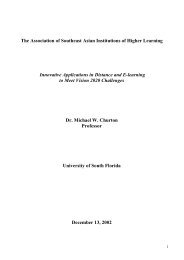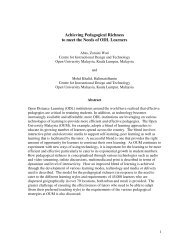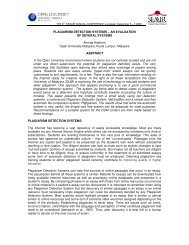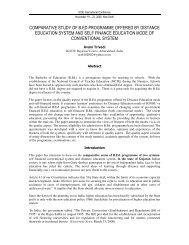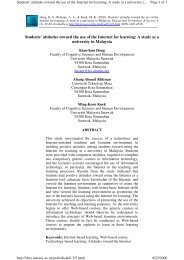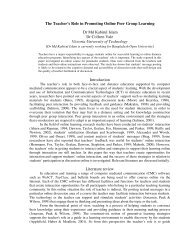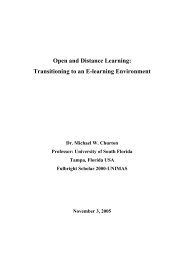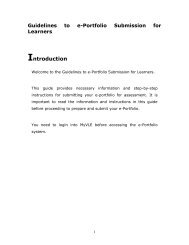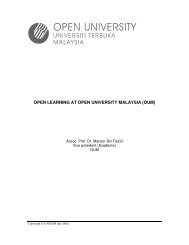e-learning readiness - Asia Pacific Region - Open University Malaysia
e-learning readiness - Asia Pacific Region - Open University Malaysia
e-learning readiness - Asia Pacific Region - Open University Malaysia
- No tags were found...
You also want an ePaper? Increase the reach of your titles
YUMPU automatically turns print PDFs into web optimized ePapers that Google loves.
Finally, it was suggested that steps be taken to secure the systems used tosupport and/or deliver E-<strong>learning</strong> systems from viruses threats, hackingand other deviant Internet practices.From the table, it is clear that E-<strong>learning</strong> providers have a high degree oftechnical <strong>readiness</strong> at their respective organisations.Environmental ReadinessA positive environment for E-<strong>learning</strong> is another crucial factor as itdetermines the success of E-<strong>learning</strong> deployment. For example, thegovernment should establish policies which encourage and sustain thedevelopment and growth of E-<strong>learning</strong> in the country.When looking at the environmental <strong>readiness</strong> pattern in the data analysis(Table 24), 64.0 percent of the providers (48 respondents) governmentpolicies have enhanced E-<strong>learning</strong> in their organisation. On the otherhand 42.7 percent (32 respondents) believed that certain governmentpolicies have hindered plans at their respective organisations to invest inE-<strong>learning</strong>. Almost 90 percent (89.3 percent, or 67 respondents) believedthat it is important to have a central agency to play an active role inregulating, in competency development, in research, and in intelligencegathering of E-<strong>learning</strong> initiatives in <strong>Malaysia</strong>. This perception was heldby almost half of the group (49.3 percent, or 37 respondents) who thoughtthat the mass media has helped to promote the value of E-<strong>learning</strong>.About 62.7 percent of the group (47 respondents) believed that the lack oflegal provisions on Intellectual Property (IP) have hindered thedevelopment of E-<strong>learning</strong> content. When asked about the lack of Englishproficiency, 48 respondents (64 percent) thought that it had hindered theprogress of E-<strong>learning</strong> at their organisation.When asked to elaborate further, respondents stated that the educationalsector like the Ministry of Education had not given full support andcommitment towards E-<strong>learning</strong> initiatives. There is a lot of talk about E-<strong>learning</strong>, but generally most of the steps taken have not been effective. Sofar, most of the E-<strong>learning</strong> initiatives have been exclusive to anorganisation, even though these initiatives could be extended to otherorganisations. So, it is proposed that a centralized agency set up tocoordinate the efforts of different organisations.The mass media’s role as an agent of awareness was also seen to beimportant. The media was expected to expose the public to vitalinformation on E-<strong>learning</strong> to enhance the public’s understanding of theconcept of E-<strong>learning</strong>. I was perceived that once the concept isunderstood, the public would be more receptive towards the concept of<strong>learning</strong> via electronic means.The respondents stated that the issue of Intellectual Property should beaddressed by the Government to encourage subject matter experts toJoint Study by MEWC and OUM 38



